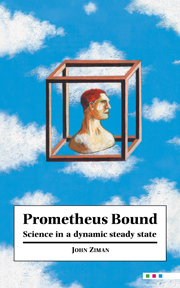Book contents
- Frontmatter
- Contents
- Preface
- 1 What is happening to science?
- 2 Scientific and technological progress
- 3 Sophistication and collectivization
- 4 Transition to a new regime
- 5 Allocation of resources
- 6 Institutional responses to change
- 7 Scientific careers
- 8 Science without frontiers
- 9 Steering through the buzzword blizzard
- Further reading
- Index
4 - Transition to a new regime
Published online by Cambridge University Press: 05 August 2012
- Frontmatter
- Contents
- Preface
- 1 What is happening to science?
- 2 Scientific and technological progress
- 3 Sophistication and collectivization
- 4 Transition to a new regime
- 5 Allocation of resources
- 6 Institutional responses to change
- 7 Scientific careers
- 8 Science without frontiers
- 9 Steering through the buzzword blizzard
- Further reading
- Index
Summary
Jack saw that the beans had all come up and had grown most wonderfully.
A history of rapid, unimpeded growth
Ever since modern science ‘took off’ in the seventeeth century, it has been a growth industry. Knowledge and technical capabilities have not only accumulated steadily: the rate of accumulation has also accelerated over time. The scale of all scientific and technological activities has continually expanded. Every measure of these activities – numbers of people engaged, resources employed, output of published papers and patents, commercial and industrial impact, etc. – seems to have been increasing exponentially for the best part of three centuries.
Of course, that same period has seen immense growth in many other parameters of national life: population, industrial production, ‘gross national product’, education, and so on. Nevertheless, the overall growth rate of science throughout this whole period has been exceptional. In the 1680s, for example, England had a total population of about 5 million: nowadays, the United Kingdom has a population of about 50 million – ten times greater. Even if we multiply this by another factor often, to allow for the fact that people are now much richer individually than they were before the Industrial Revolution, we still fail by a whole order of magnitude to match the thousandfold growth of scientific and technological activity in Britain since that time.
Much the same elementary historical calculation could be made for other European countries such as France and Germany.
Information
- Type
- Chapter
- Information
- Prometheus Bound , pp. 67 - 92Publisher: Cambridge University PressPrint publication year: 1994
